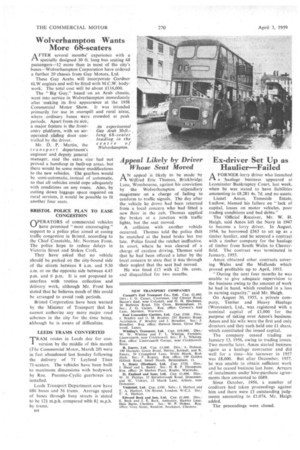Wolverhampton Wants More 68-seaters
Page 52

If you've noticed an error in this article please click here to report it so we can fix it.
AFTER several months' experience with a AFTER
designed 30 ft. long bus seating 68 paS1engers-12 more than in most of the city's buses--Wolverhampton Corporation have ordered a further 20 chassis from Guy Motors, Ltd.
These Guy Arabs will incorporate Gardner 6LW engines and will be fitted with M.C.W. bodywork, The total cost will be about £116,000.
The Big Guy," based on an Arab chassis, went into service in Wolverhampton immediately after 'making its first appearance at the 1958 Commercial , Motor Show. It was intended primarily. foruse in overspill and rural areas, where .ordinary buses were crowded at peak periods. Apart from its size, a major feature is the frontentry platform, with an air operated door controlled by the driver.
Mr. D.. . P. Martin, •the transport department's engineer and depoty, general manager, said the extra, size had not proved a handicap in built-up areas, but there would be some minor modifications to the new vehicles. The gearbox would be semi-automatic, instead of automatic, so that all vehicles could cope adequately with conditions on any route. Also, by cutting down luggage space requiredon rural services, it would be possible to fit another four seats. An experimental Guy Arab 30-ft.long 68-seater loading in the centre of Wolverhampton.
BRISTOL POLICE PLAN TO EASE CONGESTION
(IPERATORS of commercial vehicles s--.1 have promised "most encouraging" support to a police plan aimed at easing traffic congestion in Bristol, according to the Chief Constable, Mr. Norman Frost. The police hope to reduce delays in Victoria Street and Stokes Croft.
They have asked that no vehicle should be parked on the city-bound side. of the sireets betWeeti 8 a.m. and 9.30 a.m, or on the opposite side between 4,45 p.m. and 6 p.m. It is not proposed to interfere with routine collection and delivery work, although Mr. Frost has stated that he believes much of this could be arranged to avoid rush periods.
Bristol Corporation have been warned by the Minister of Transport that he cannot authorize any more major road schemes in the city for the time being, although he is aware of difficulties.
LEEDS TRAMS CONVERTED
TRAM routes in Leeds due for con' version by the middle of this month (The Commercial Motor, March 20) were iii fact abandoned last Sunday following the delivery of 71 Leyland Titan 71-seaters. The vehicles have been built to maximum dimensicins with bodywork by Roe. Pneurno-Cyclic gearboxes are installed.
Leeds Transport Department now have 686 buses and 56 trams. Average speed of buses through busy streets is 'stated to be 121 m.p.h. compared with 8I m.p.h. by trams.
o4
Appeal Likely by Driver Whose Seat Moved
AN appeal is likely to be made by Wilfred Eric Thomas, Brickbridge Lane, Wombourne, against his conviction by the Wolverhampton stipendiary magistrate on a charge of falling to conform to traffic signals. The day after the vehicle he drove had been returned from a local concern who had fitted a new floor in the cab, Thomas applied the brakes at a junction with traffic lights, but the seat moved.
A collision with another vehicle occurred. Thomas told the police that he snatched at the hand brake but too late. Police found the ratchet ineffective. 111 court, where he was cleared of a charge of careless driving, Thomas said that he had been offered a letter by the local concern to state that it was through -their neglect that the seat had moved.
He was fined £15 with £2 10s. costs, and disqualified for two months.
Ex-driver Set Up as Haulier—Failed
A FORMER lorry driver who launched a haulage .business appeared at Leominster Bankruptcy Court, last week, when he was stated to have liabilities amounting to 0,281 4s. 7d. and no assets.
Lionel Amos, Terneside Estate, Ludlow, blamed his failure on "lack of capital, losses on motor vehicles, poor trading conditions and bad debts."
The 'Official Receiver, Mr. W. H. Haigh, said Amos left the Navy in 1947 to become a lorry driver. In August, 1954, be borrowed £365 to set up as a timber haulier, and he secured a contract with a timber company for the haulage of timber from South Wales to Chesterfield. The contract was terminated in January, 1955;
Amos obtained other contracts -covering Wales and the Midlands which proved profitable up to Apra, 1955.
"During the next four months he was unable to give adequate supervision to the business owing to the amount of work he had in hand, which resulted in a loss in earning capacity," said Mr. Haigh.
On August 30, 1955, a private company, Timber and Heavy Haulage (Worcester), Ltd., was registered with a nominal capital of £1,000 for the purpose of taking over Amos's business. Amos and his wife were the first and only directors and they each held one £1 share, which constituted the issued capital.
The company ceased trading on January 13, 1956, owing to trading losses. Two months later, Amos started business again as a haulage contractor and did well for a time—his turnover in 1957 was £8,000. But after December, 1957. he was unable to obtain sufficient work and he ceased business last June. Arrears of instalments under hire-purchase agreements then amounted to £689.
Since October, 1956, a number of creditors had taken proceedings against him and there were 13 outstanding judgments amounting to £1,074, Mr. Haigh added.
The proceedings were closed.
































































































































